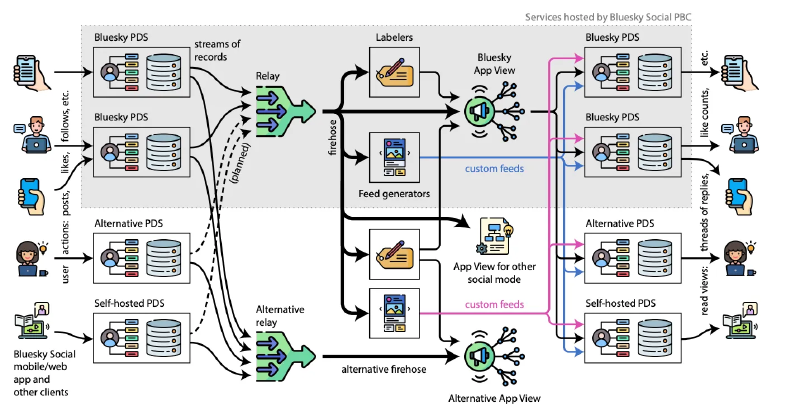This post has been a long time coming. The topic has been rattling around in my head for awhile. I simply did not have the time or energy to write it up.
A bit of history #
From around 2016 on, the discussion around the influence of social media on politics and life in general–whether it has done more harm than good–has only increased. With most social media platforms under the control of a single entity–e.g., Twitter; Facebook, Instagram, WhatsApp, and Threads now all under Meta; TikTok under ByteDance–if not a single individual–e.g., Jack Dorsey and then Elon Musk, Mark Zuckerberg–the inevitable concerns of how such influence could be (ab)used to manipulate others has also grown. This ground has been well covered by others so I won’t waste time on this.
As I type this, TikTok has gone offline in the U.S. (for the moment) in part due to such concerns, though notably this one is centered more around foreign influence. But the “domestic” social media services hold as much risk of public manipulation, if not more. One has to but look at the news to see how the individuals who own these platforms are behaving lately. And this goes beyond social media to more traditional news, such as Jeff Bezos who owns The Washington Post.
So in that environment, let us focus on Twitter here. We have seen how Twitter struggled with moderation while Jack Dorsey was at the helm. And we saw how things only got progressively worse once Elon Musk bought Twitter. From idiotic things like paying for the blue checkmark, firing a good percentage of the staff, removing what little moderation they did already, and making it that you had to sign in to see most content, piece by piece Elon Musk has driven Twitter into the ground financially. Estimates (since it is no longer publicly listed) vary, with articles indicating that Twitter may be worth 72% less) (or even higher) than when Elon bought it.
But more importantly, folks are fed up with the cesspool that Twitter has become.
And it is in this environment that, in the past two years, we have seen a massive migration of users to Bluesky.
NOTE
Before anyone chews my head off, yes, there is the Fediverse, the true, OG open-source, federated alternative to centralized social media platforms like Twitter. Built on ActivityPub, and notably with apps like Mastodon, initially some Twitter users looking for an alternative moved to Mastodon. In fact, Mastodon saw a huge boost in users in light of the dumpster fire that is Twitter.However, the total percentage of Twitter users that defected to Mastodon was quite small. This was likely due to the usual challenges that often come with free/libre open source (FLOSS) projects. That is, while FLOSS provides the ultimate freedom to the user, that freedom often comes at the cost of simplicity.
Specifically, Twitter users are used to simply going to a single website, creating an account where all they really need to provide is a username and password (like one might to create a Gmail account), and at most, installing a Twitter app on their phone. (Before Twitter shuttered their API setup, users had more options for Twitter clients. But that is another story.)
With Mastodon, this is not the case. First, a user has to pick WHICH Mastodon instance they want to create their account on. Then once their account is created, they have to deal with navigating the complexity of a federated system. Simply finding/following others, especially if on other Mastodon servers, is not as simple as it is with Twitter.
In short, the user experience (UX) is not as simple/easy as a centralized, single service like Twitter offers. And if users wish to truly control their social media and setup their own Mastodon server instance, that is a whole other level of complexity. So while Mastodon truly is an open-source, federated social media network, it simply has too high a “friction level” for many basic Twitter users.
Bluesky #
Bluesky is the decentralized, distributed, federated offspring of Twitter itself. Created at Twitter while Jack Dorsey was still there, Bluesky was later funded by Jack even after it became an independent entity as Bluesky Social. In light of all the drama around Twitter and Elon Musk, ultimately Bluesky was seen as the alternative to jump to.
With each successive change by Elon that triggered more folks to look for alternatives, Bluesky would see its numbers jump. In some cases, Bluesky would record millions of new users joining in a day, usually after something Elon had done.
Why Bluesky? The key factor is really that Bluesky “feels like Twitter from ten years ago.” That is, Bluesky’s UX is familiar to Twitter users. It harkens back to the “golden age of Twitter”, if ever such an era existed.
But coupled with that, Bluesky touted its open standard AT Protocol as the guarantee that users would not have to sacrifice their freedom/independence to a single entity. That is, Bluesky has a decentralized architecture. Don’t want to have your account hosted by them? Ok, you can go run your own instance, or possibly create an account on some hosted instance, much like Mastodon.
It all sounded fantastic. A decentralized, distributed, open standards protocol based offering, complete with a reference implementation. To those who had stood up ActivityPub servers or things like XMPP or Matrix protocol servers, this seemed the way to go.
The Pivot #
Then in May 2024, Jack Dorsey did a 180 degree turn and bailed on Bluesky, claiming it was becoming another Twitter. Worse, he encouraged folks to remain on Twitter (now called X)! And he began advocating for something called Nostr.
At the time, I wrote on Bluesky:
Not sure what to make of the “Meth Unabomber” (a.k.a., Jack Dorsey) leaving Bluesky board, encouraging folks to remain on X, and endorsing Nostr. Is every rich a_hole just losing their sh_t in different ways? www.businessinsider.com/jack-dorsey-… www.theguardian.com/technology/a… nostr.com
as it seemed that Jack Dorsey had lost his mind. After the way Elon Musk had been behaving, it almost felt like there must be something wrong with becoming a tech billionaire.
But eventually I decided to look into this Nostr business. More on that in another post.
More importantly, though, after reading up on Nostr and seeing how it worked, I circled back to Bluesky’s documentation, as I kept wondering WHY Jack Dorsey had changed his mind on Bluesky. Was he nuts? Or was there any merit to what he was saying?
The Chokepoint #
So I went off and read various things.1 This eventually led me to reading the AT Protocol documentation. And while on initial reading I did not notice it, later while simply staring at this diagram2:

it finally dawned on me.
Looking above, pay careful attention to how information flows from left to right. You start with someone wanting to post on the left, ending with someone receiving that post on the right. And the servers in question on both left and right are the same. Specifically, trace the path from Alternative/Self-hosted PDSs on the lower left to Bluesky PDS users on the upper right. Also trace the path from Bluesky PDSs on the upper left to Alternative/Self-hosted PDS users on the lower right. Notice anything?
Bluesky controls BOTH flows. While yes, you can have an Alternative/Self-hosted PDS for your own messages, you cannot reach Bluesky users unless Bluesky allows it. In fact, you cannot reach other Alternative/Self-hosted PDSs without flowing through Bluesky! And even if you choose to have a Bluesky account, once again Bluesky decides whether or not you can reach Alternative/Self-hosted users. That is a choke point and single point of censorship, no different than the current Twitter/X setup.
Also notice the dashed “(planned)” lines, as clearly when this document was written, this path did not exist. Does it now? If not, then currently you have NO path from Alternative/Self-hosted PDSs to reach Bluesky users… or pretty much anyone.
Again the emphasis here is on “If you want to reach your friends, it is best to have a Bluesky account.” And if Bluesky Social ever changes (e.g., it is bought by some idiosyncratic billionaire man-child), what options do you have? Basically you traded one tyrant for another.
Summary #
This is not to say Bluesky Social will succumb to this future. Hopefully the folks running it are in it for the long-haul and have a moral compass. But unfortunately, whether for good or ill, the architecture of Bluesky is such that it could go either way. The architecture does not PREVENT the same outcome as we have seen with Twitter. So for all the talk of an open standard, blah blah blah, Bluesky really is not really that different.
As long as folks go into it with eyes wide open knowing this, then it is a choice they have to life with.
But for those looking for possible alternatives that, by their very design, are less prone to the kind of outcome that Elon Musk’s purchase of Twitter has wrought, other alternatives like Nostr may be worth a look.
